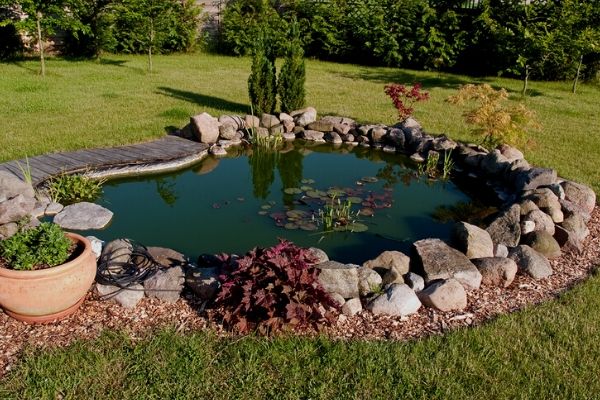Welcome to the serene world of decorative fish ponds! Whether you’re looking to elevate your garden’s aesthetic or create a tranquil retreat, a fish pond can be the perfect solution. With my personal experiences and extensive research, this guide will walk you through everything you need to know to create and maintain your own stunning aquatic haven.
Understanding Decorative Fish Ponds
Decorative fish ponds are more than just a place for fish; they are a lively ecosystem that adds beauty and charm to any garden. In this section, we’ll explore the primary components that make a decorative fish pond special.
Benefits of Having a Decorative Fish Pond
- Aesthetic Appeal: A well-designed pond enhances the beauty of your garden.
- Wildlife Habitat: Ponds attract birds, butterflies, and beneficial insects.
- Relaxation Space: The soothing sound of water promotes relaxation.
- Educational Opportunity: Great for teaching kids about ecosystems and nature.
Designing Your Decorative Fish Pond
The design of your pond is crucial to its success and beauty. Below are some key aspects to consider when designing your pond.
Choosing the Location
Consider sun exposure, visibility from your home, and accessibility for maintenance. A spot with partial sunlight is ideal.
Sunlight Requirements
A pond needs about 4-6 hours of sunlight each day to promote healthy plant growth.

Pond Shapes and Sizes
From circular to kidney-shaped ponds, the shape and size depend on your space and personal preference. Here’s a simple comparison:
| Shape | Ideal Size | Benefits |
|---|---|---|
| Round | Small to Medium | Symmetrical, easy to maintain. |
| Rectangle | Medium to Large | More linear, good for landscaping. |
| Freeform | Variable | Naturalistic, blends well with landscapes. |
Choosing the Right Materials
Common materials include concrete, liner, and pre-formed kits. Each has its pros and cons:
- Concrete: Durable but expensive and requires professional installation.
- Liner: Affordable and easy to install, but can puncture.
- Pre-formed Kits: Quick installation but limited shape options.

Stocking Your Fish Pond
Choosing the right fish is essential for the health and beauty of your pond. Here are some popular options:
Koi Fish
Koi are a favorite for decorative ponds due to their vibrant colors and patterns.
Goldfish
Easy to care for and available in various colors, goldfish are perfect for smaller ponds.
Comet Fish
Similar to goldfish but with longer fins, comets are active swimmers that add life to your pond.
Fish Care Tips
Ensure proper stocking density to maintain water quality, and consider seasonal changes affecting fish behavior.

Maintaining Your Decorative Fish Pond
Regular maintenance is key to a thriving pond. Here are essential maintenance tips:
Water Quality Management
Regularly test your pond water for pH, ammonia, nitrites, and nitrates. Aim for a pH of 6.5 to 8.5 for healthy fish.
Filtration and Aeration
Invest in a good filtration system and consider aeration methods to keep the water oxygenated and clear.

Seasonal Maintenance
- Spring: Clean the pond, remove debris, and check equipment.
- Summer: Monitor water temperature and algae growth.
- Fall: Prepare for winter by removing leaves and debris.
- Winter: Ensure there is an air hole in the ice for gas exchange.
Common Pond Issues and Solutions
Even the most well-maintained ponds may face challenges. Here are some common issues:
Algae Overgrowth
Caused by excess nutrients, algae can be managed through proper filtration and avoiding overfeeding fish.

Water Clarity Issues
Cloudy water can indicate imbalanced water chemistry. Regular testing and adjustments are necessary.
Dealing with Pond Snails
While beneficial in small numbers, an overpopulation of snails can lead to problems. Introduce natural predators like some fish species to control their population.

Enhancing Your Fish Pond Landscape
Landscaping around your pond adds beauty and functionality.
Plant Selection
Choose a mix of submerged, marginal, and floating plants for a balanced ecosystem.
Popular Plants
- Lilies: Provide shade and beauty.
- Snakeshead Fritillary: Attracts pollinators.
- Water Hyacinth: Great for filtering water.
Adding Hardscape Features
Incorporate rocks, waterfalls, or bridges to enhance the visual appeal and create a naturalistic environment.
Personal Experience: My Journey with Decorative Fish Ponds
Reflecting on my own experience with decorative fish ponds, I remember the excitement of my first pond setup. The planning, the selection of fish, and seeing everything come together was nothing short of magic. However, I also learned some valuable lessons along the way:
- Patience is Key: Establishing a healthy ecosystem takes time.
- Regular Maintenance: Skipping maintenance can lead to bigger problems down the line.
- Community Matters: Connecting with local pond enthusiasts provided me with support and valuable insights.
FAQs about Decorative Fish Ponds
What is the best size for a decorative fish pond?
The size depends on the type and number of fish you plan to keep. A minimum of 500 gallons is recommended for koi fish, while goldfish can thrive in smaller ponds.
How do I prevent pests around my pond?
Consider adding plants that repel pests and introduce fish that feed on mosquito larvae, like guppies.
What type of fish can I keep together?
Koi and goldfish can coexist, but avoid mixing aggressive species or those with vastly different care requirements.
How often should I clean my pond?
Cleaning frequency depends on pond size and fish load. Generally, a thorough clean is recommended at least once a year, with light maintenance throughout.
Can I keep plants in my fish pond?
Absolutely! Aquatic plants are beneficial for water quality and provide shade and shelter for fish.